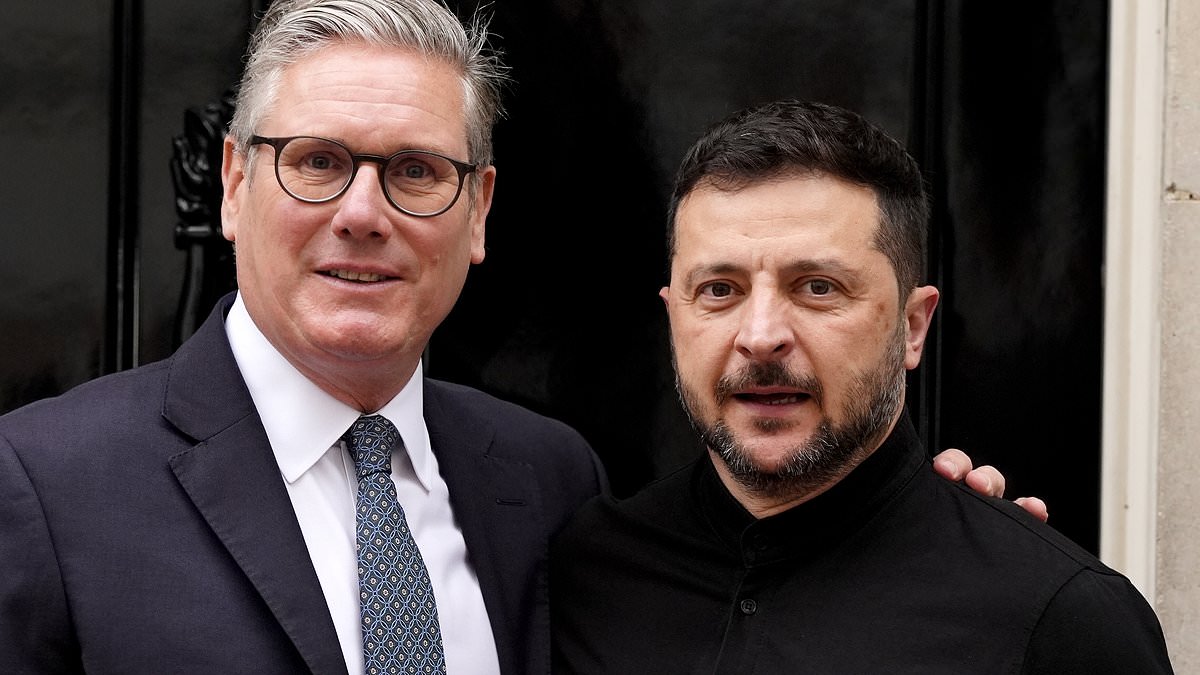
In a pivotal moment for global diplomacy, Sir Keir Starmer is set to join European Union and NATO leaders as they unite to support Ukrainian President Volodymyr Zelensky ahead of a critical meeting with former U.S. President Donald Trump at the White House on Monday. This assembly aims to present a united front, counter potential setbacks, and moderate Trump’s unpredictable stance on Ukraine following his controversial February Oval Office meeting with Zelensky.
EU Leaders Rally Behind Ukraine
European ministers and key leaders have expressed their concerns that Zelensky could face undue pressure in negotiations, with fears intensified after Russian President Vladimir Putin’s recent manipulative tactics at the Anchorage summit. Putin’s alleged attempts to corner Ukraine into territorial concessions, particularly in the Donbas region, have sparked outrage. French President Emmanuel Macron said, “If we’re not strong today, we’ll pay dearly tomorrow,” highlighting the urgency of a firm response.
Zelensky revealed on Sunday that the UK and other supportive nations had convened a “useful” two-hour video conference to establish a unified vision of peace—a peace founded on no forced territorial changes. Former UK Prime Minister Boris Johnson has called on Starmer to take a lead role in rallying global resistance against Russia’s alleged expansionist agenda.
Tensions Escalate After Anchorage Summit
Friday’s controversial summit in Anchorage, Alaska, where Putin reportedly gained significant leverage, has stirred debates. During the meeting, Putin attempted to legitimize fabricated evidence of Ukraine’s military vulnerability, pressing for a ceasefire on heavily skewed terms. Reports suggest that Washington might have considered aligning with Putin’s proposal, prompting European leaders to act decisively in defense of Ukraine’s sovereignty.
President Trump, however, dismissed these accounts as “fake news,” calling the Anchorage summit a “great meeting” and urging the world to “STAY TUNED” for further developments. Meanwhile, Trump’s special envoy, Steve Witkoff, claimed that the U.S. delegation had secured groundbreaking NATO-like security guarantees for Ukraine—a move hailed as a potential game changer.
The Global Focus Shifts to Monday’s White House Meeting
As the world’s attention turns to Monday, Keir Starmer has affirmed his unwavering commitment to Ukraine’s cause, emphasizing that “the path to peace cannot be decided without President Zelensky.” He also extended cautious praise to Trump for his stated efforts to end Russia’s illegal incursion into Ukraine, while urging NATO allies to strengthen their defense commitments.
Key European and NATO support figures, including Macron, Italian Prime Minister Giorgia Meloni, German Chancellor Friedrich Merz, and European Commission President Ursula von der Leyen, are expected to stand in solidarity with Zelensky. Meanwhile, former U.S. Vice President Mike Pence made headlines by categorically denouncing Putin as “the bad guy” and urging immediate sanctions against Russia if negotiations falter.
Ukraine’s Position Amid Pressure
Zelensky has resisted attempts to force territorial compromises, stating plainly that such discussions should involve only Ukraine and Russia. Flanked by von der Leyen in Brussels, he reiterated the necessity for negotiations to begin with Ukraine’s current front lines as the baseline. He also criticized Russia’s continued evasion of ceasefire agreements, labeling it a deliberate strategy to prolong violence and instability.
Despite the mounting challenges, Zelensky remains hopeful. He described the U.S.’s provisional security guarantees as “historic” while urging practical implementation across land, air, and sea. The coalition of the willing, composed of the UK and allied nations, has signaled readiness to deploy a reassurance force should hostilities ease—an unmistakable message of international resolve.
What Lies Ahead?
As Monday’s monumental meeting approaches, the stakes for Ukraine—and global stability—could not be higher. With leaders rallying to counter Russia’s aggression and ensure peace through diplomacy, all eyes remain fixed on the White House. The outcomes will undoubtedly shape the geopolitical landscape for years to come.






